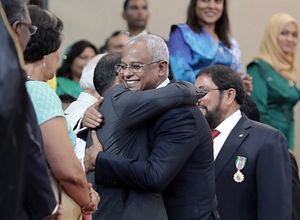Fans of liberal democracy had little to celebrate in 2018. But its recent and unexpected resurrection in the Maldives, reversing a half-decade decline into authoritarianism, gives cause for some cheer.
The architect of democratic deterioration, President Abdulla Yameen, lost elections on September 23 despite near absolute capture of all independent institutions, including the elections authority, security forces, and both the judiciary and its watchdog body. For much of his tenure the opposition was either jailed or forced into exile over sham charges of terrorism, to be joined by many allies fallen out of favor. Yameen himself was mired in corruption scandals, including a 2016 Al Jazeera investigation alleging his involvement in a money-laundering racket thought to be worth over $1 billion. He wielded his parliamentary majority to recriminalize defamation, while media critical of the regime found itself slapped with heavy fines.
Such was the extent of Yameen’s grip on the Maldives that few foreign governments even bothered to send observers to September’s elections. Monitoring had usually been the prerogative of the Commonwealth, but Yameen unilaterally announced the country’s exit from the international body in 2016 after it failed to recognize his “achievements in cultivating a culture of democracy in the country and in building and strengthening democratic institutions.”
The elections commission, “strengthened” with Yameen’s cronies and headed by the former chief of his own political party, rejected the candidacy of his principle opponent: exiled former President Mohamed Nasheed of the Maldivian Democratic Party (MDP). Foreign journalists were all but banned from even entering the country, turned away under a spurious and kafkaesque new visa scheme demanding bank statements and medical certificates.
Nasheed seemed to decide the MDP had few options other than to play Yameen’s game of democratic pageantry, and withdrew from the running. In his stead, the MDP fielded the quietly-spoken Mohamed Ibrahim “Ibu” Solih. A close, if rather more temperate, ally of Nasheed’s, Solih had kept the party running during its years in the wilderness but otherwise seemed content to remain in the background. He appeared little threat to both Yameen and the MDP’s ambitious new fair weather friends.
Astonishingly, Solih won with over 58 percent of the vote.

































